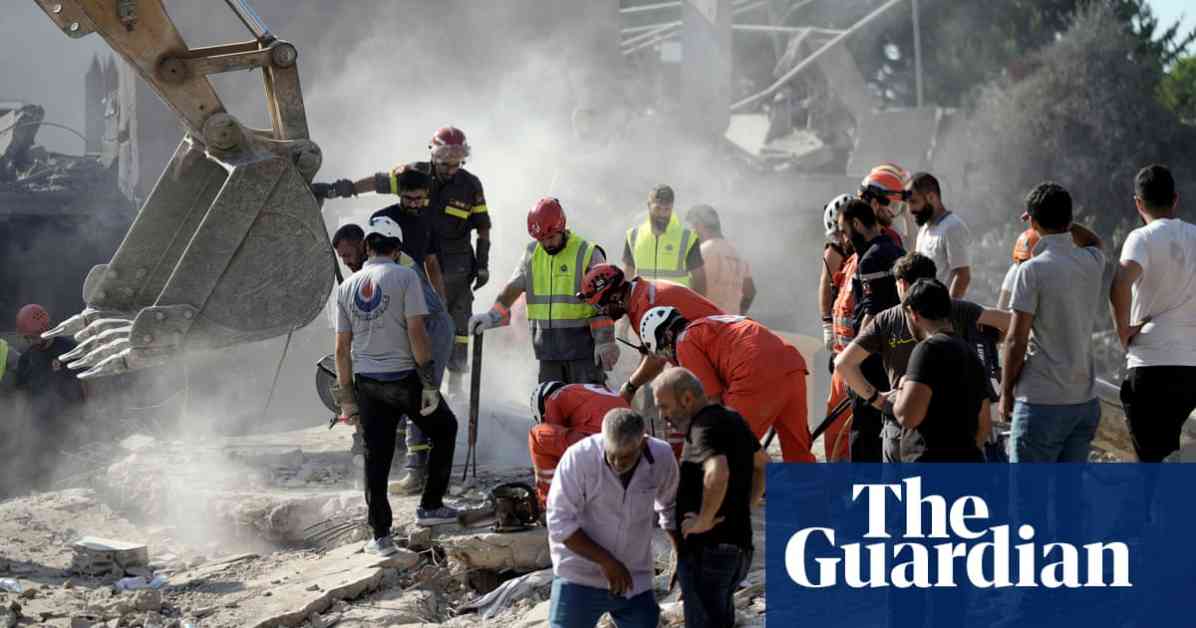France and US Push for 21-Day Hezbollah-Israel Ceasefire in Lebanon Amidst UN Chief’s Warning
In the midst of escalating tensions between Israel and Hezbollah in Lebanon, the United States and France have joined forces in calling for a temporary 21-day ceasefire to pave the way for broader negotiations. The urgency of this call was emphasized by the UN secretary general, António Guterres, who expressed grave concerns about the deteriorating situation in Lebanon, stating that “hell is breaking loose.”
Israel’s top general has indicated that the country is preparing for a potential ground operation into Lebanon following a relentless three-day bombing campaign that has resulted in the deaths of over 600 people. This alarming development has raised fears of a broader regional conflict that could have devastating consequences for civilians on both sides of the border.
The joint statement issued by US President Joe Biden and French President Emmanuel Macron underscored the need for a resolution along the Israel-Lebanon border that prioritizes the safety and security of civilians, allowing them to return to their homes without fear of further violence. The recent exchange of fire, particularly in the past two weeks, has heightened the risk of a wider conflict and has inflicted significant harm on innocent civilians caught in the crossfire.
During their meeting on the sidelines of the UN General Assembly in New York, Biden and Macron collaborated on proposing a temporary ceasefire to create space for diplomatic efforts to succeed and prevent further escalations across the border. This initiative has garnered support from a coalition of countries including Australia, Canada, the European Union, Germany, Italy, Japan, Saudi Arabia, United Arab Emirates, and Qatar, underscoring the international community’s commitment to averting a full-blown crisis in the region.
The announcement of the proposed ceasefire came after a tense session at the UN Security Council, where Lebanon’s Prime Minister Najib Mikati accused Israel of violating his country’s sovereignty and causing immense suffering to the Lebanese population. Mikati highlighted the overwhelming strain on Lebanese hospitals, which are struggling to cope with the influx of casualties resulting from the ongoing hostilities.
In response, Israel’s UN envoy refuted accusations of seeking a full-scale war, attributing the instability in the region to the influence of Iran, whom he identified as the primary driver of conflict in the Middle East. Iranian Foreign Minister Abbas Araqchi, on the other hand, criticized the unwavering support extended to Israel by the US and UK, alleging that it has emboldened Israel to engage in aggressive actions with impunity.
Despite mounting pressure for an immediate ceasefire, there have been differing opinions among the US and its European allies regarding the timing and nature of the intervention. While UK Foreign Secretary David Lammy advocated for an urgent cessation of hostilities to prevent further bloodshed, US diplomats expressed reservations about issuing a unilateral ceasefire call that could be perceived as equating the actions of Israel and Hezbollah.
The proposed 21-day ceasefire aims to provide a brief respite from the violence and create an opportunity for renewed negotiations, particularly in the context of the stalled talks between Hamas and Israel in Gaza. Hezbollah has indicated its willingness to halt hostilities if Hamas agrees to a ceasefire in Gaza, but as of now, there has been no indication of a breakthrough in these discussions.
As Israeli Prime Minister Benjamin Netanyahu prepares to address the situation in New York, the international community remains hopeful that a temporary ceasefire could pave the way for a more sustainable peace agreement that addresses the root causes of the conflict. The US deputy envoy stressed the importance of diplomatic efforts in de-escalating the crisis and expressed deep concerns about the loss of civilian lives on both sides.
In light of the recent developments, it is imperative for all parties involved to prioritize the well-being of civilians and seek a peaceful resolution to the conflict that has ravaged the region. The proposed 21-day ceasefire represents a crucial opportunity for dialogue and negotiation, offering a glimmer of hope in the midst of escalating tensions and uncertainty in Lebanon.












